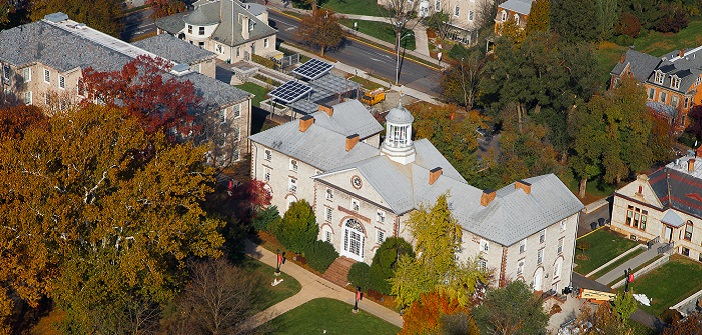Strategic Sustainability at Dickinson

Climate Neutral by 2020:
Dickinson College, a Charter Signatory and member of the Leadership Circle of the American College and University Presidents Climate Commitment, has set 2020 as a target date for zero net emissions of greenhouse gases. A Climate Leadership Award from Second Nature recognized our climate change actions and education.
Strategic Plan II:
Sustainability was made a defining characteristic of Dickinson College with our 2005 Strategic Plan II, which states "We recognize that engaged global citizenship requires an awareness of, and respect for, the natural world that supports the social world. We also recognize that responsible citizenry requires the prudent use of resources of all types, physical and fiscal. Educating for sustainability requires a holistic approach to decision-making that embodies liberal arts education and promotes an engaged community. The College must serve as a living example of sustainability in all arenas.
Strategic Plan III:
Our new Strategic Plan III of 2011 affirms sustainability as a defining characteristic of the college, and our commitment to become climate neutral. It also identifies sustainability as an area of study for special emphasis in our curriculum, and calls for melding our sustainability and global education initiatives, and taking full advantage of sustainability's potential for enhancing active learning by using the campus as a living laboratory.
Campus Master Plan:
Our 2008 Campus Master Plan, which provides a long-term vision for campus grounds and facilities, states that we will "Create a campus culture that is committed to ecological sustainability, both operationally and academically" and that we will "instill a culture of prudent use of resources and respect for the natural world that supports civilized society."
Landscape Design Guidelines:
The purpose of the Landscape Management Guidelines and Landscape Management Plan is to provide Dickinson College a flexible, yet unifying framework for the design and management of the landscape. This guidance aims to balance several goals from the various stakeholders including to reflect the values of the College through design and management, including the College’s commitment to sustainability.
Diversity Strategic Plan:
Our Diversity Strategic Plan serves as the framework to work toward our strategic objective to “support a climate on campus that builds community and encourages open dialogue on issues of intellectual, ethical and social importance, teach and model for students the practice of engagement with critical and controversial issues related to difference in our culture and foster a sophisticated understanding of the balance between our diversity and the commonalities inherent in our shared humanity”.
LEED Building Policy:
In 2007 we made it our policy to construct all new buildings and major renovations to meet a minimum standard for LEED Silver certification (Leadership in Energy and Environmental Design). Since adopting this policy, all completed projects have earned LEED Gold certification.
International Declarations:
Dickinson signed the Talloires Declaration in 2010, committing the College to create an institutional culture of sustainability and educate for environmentally responsible citizenship. In 2012 we signed the Rio+20 Declaration of Higher Education, which states that we will teach sustainable development concepts, encourage research on sustainable development issues, green our campus, and support sustainability efforts in our community.
Sustainable Transportation Fuel Policy:
In an effort to reduce carbon emissions in association with the college’s carbon neutrality commitment, the college places a strong preference for fuels that have environmental benefits, while also giving consideration to financial costs.